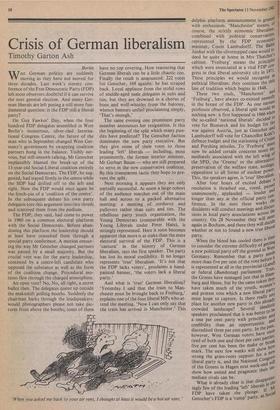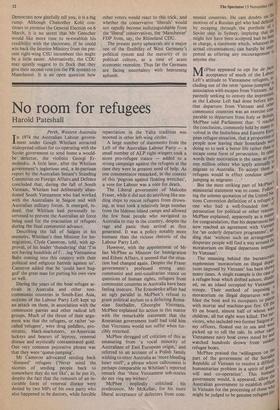Crisis of German liberalism
Timothy Garton Ash
Berlin
West German politics are suddenly moving as they have not moved for three decades. Last week's stormy con- ference of the Free Democratic Party (FDP) left most observers doubtful if it can survive the next general election. And many Ger- man liberals are left posing a still more fun- damental question: is the FDP still a liberal party?
On Guy Fawkes' Day, when the four hundred FDP delegates assembled in West Berlin's monstrous, silver-clad Interna- tional Congress Centre, the future of the man who in September changed West Ger- many's government by swapping coalition partners hung in the balance. Visibly ner- vous, but still smooth-talking, Mr Genscher implausibly blamed the break-up of the 13-year-old Social-Liberal coalition entirely on the Social Democrats. The FDP, he sug- gested, had stayed firmly in the centre while the SDP had drifted off to the left and right. Now the FDP would once again be the lynch-pin of a 'coalition of the centre'. In the subsequent debate his own party delegates tore this argument into tiny shreds and scattered them from the podium.
The FDP, they said, had come to power in 1980 on a common electoral platform with the Social Democrats. Before aban- doning this platform the leadership should at least have consulted them through a special party conference. A motion censur- ing the way Mr Genscher changed partners was passed by a small majority. But the crucial vote was for the party leadership, contested by a centre-left candidate who opposed the substance as well as the form of the coalition change. Procedural mo- tions flew through the charged atmosphere.
An open vote? No, No, all right, a secret ballot then. The delegates queue up outside the makeshift polling booths. Suddenly the chairman barks through the loudspeakers: would photographers please not take pic- tures from above the booths; some of them have no top covering.. How reassuring that German liberals can be a little chaotic too. Finally the result is announced: 222 votes for Genscher, 169 against: he has scraped back. Loyal applause from the stolid rows of middle-aged male delegates in suits and ties, but they are drowned in a chorus of boos and wolf-whistles from the balcony, whence banners unfurl proclaiming simply, 'That's enough.'
The same evening one prominent party member announces her resignation. Is this the beginning of the split which many pun- dits have predicted? The Genscher faction dominates the new party executive. But they give some of their votes to those leading 'left' liberals — including, most prominently, the former interior minister, Mr Gerhart Baum — who are still prepared to serve in the new conservative coalition. By this transparent tactic they hope to pre- vent the split.
Next morning it appears they are only partially successful. At noon a large cohort of the audience marches out of the main hall and across to a packed alternative meeting: a meeting of corduroy and pullovers rather than suits and ties. The rebellious party youth organisation, the Young Democrats (comparable with the Young Liberals under Peter Hain), is strongly represented. Here it soon becomes apparent that more is at stake than the mere electoral survival of the FDP. This is a 'caesura' in the history of German liberalism, says the first speaker. The party has lost its moral credibility. It no longer represents 'true' liberalism. 'It's not that the FDP lacks voters', proclaims a hand- painted banner, 'the voters lack a liberal party.'
And what is 'true' German liberalism? 'Yesterday I said that the train to Man- chester must be brought back to Freiburg,' explains one of the four liberal MPs who at- tend the meeting. 'Now I can only say that the train has arrived in Manchester.' This
'When you asked me back to your air vent, I thought at least it would be a hot air vent.'
The Spectator 13 November 1982 delphic platform announcement is greeted with enthusiasm. 'Manchester' means, of course, the strictly economic liberalisal, combined with political conservatism represented by the FDP economics minister, Count Lambsdorff. The Baltic Junker with the silvertopped cane would la' deed be quite at home in Mrs Thatcher'S cabinet. 'Freiburg' means the principles which were enunciated at a vital FDP con' gress in that liberal university city in 1971' These principles we would recognise as political liberalism; they continue the thin line of tradition which begins in 1848. A These two souls, 'Manchester' an 'Freiburg', have always co-existed uneasi'Y in the breast of the FDP. As one earnest professor observed, a liberal split would he nothing new: it first happened in 1866 when the so-called 'national liberals' decided t° vote for Bismarck and his budget for the, war against Austria, just as Genscher an Lambsdorff will vote for Chancellor Kohl's defence budget and the stationing of Cruise and Pershing missiles. To 'Freiburg' must now be added certain concerns more mediately associated with the left wing the SPD, the 'Greens' or the alternative: preservation of the welfare state, ecolo8Y' opposition to all forms of nuclear power' This, the speakers agree, is 'true' liberalisal. After four hours of excited debatecaj resolution is thrashed out, voted, Pass A unanimously, applauded — louder an longer than any at the official party ern,j1- ference. In the next three weeks the dissidents will conduct meetings and discus: sions in local party associations across the country. On 28 November they will le again in Bochum, and there they will decd whether or not to found a new true liberal party. t We bhnesni dtehr et bbel oeoxdt r ehma se cdoi of fil eedu ltthye re is time of gettingt a new political party off the ground in Weiss Germany. Remember that a party need ., more than five per cent of the vote beforeml` is represented at all in the provincial (Lan or federal (Bundestag) parliament. True, the Greens have managed just that in HO' burg and Hesse, but by the same token theYs have taken much of the youth, worne_ri,,,, and protest vote which a new liberal must hope to capture. Is there reallY any place for another new party in this alreau,7c crowded landscape? Several id speakers proclaimed that it was better to nye, a one per cent party with principles and credibility than an opportunistic all" discredited three per cent party. In the Pas', however, West German voters have so .07: parne tired of both one and three per cent five per cent has been the make or bre_30, mark. The next few weeks will show I."14, strong the grass-roots support for a irl`ss liberal party is, and the National Cong!1"ill of the Greens in Hagen next week-end w.,„.
me What b show and pragmatic their 11" hat is already clear is that disaPP°i!iht; ingly few of the leading 'left' liberals in 11,1 FDP have taken the plunge. If Social Genscher's FDP is a 'rump' party, as So°
Democrats now gleefully tell you, it is a big rump. Although Chancellor Kohl con- tinues to promise the General Election on 6 March, it is no secret that Mr Genscher would like more time to re-establish his credibility with the electorate. If he could win back the Interior Ministry from the pre- sent right-wing CSU incumbent this might be a little easier. Alternatively, the CDU may quietly suggest to its flock that they give their second vote (on the PR system) to Manchester. It is an open question how other voters would react to this trick, and whether the conservative 'liberals' would not rapidly become indistinguishable from the 'liberal' conservatives, the 'Manchester' FDP from, say, the Rhineland CDU.
The present party upheavals are a major test of the flexibility of West Germany's political system and the maturity of its political culture, at a time of acute economic recession. Thus far the Germans are facing uncertainty with heartening aplomb.















































 Previous page
Previous page